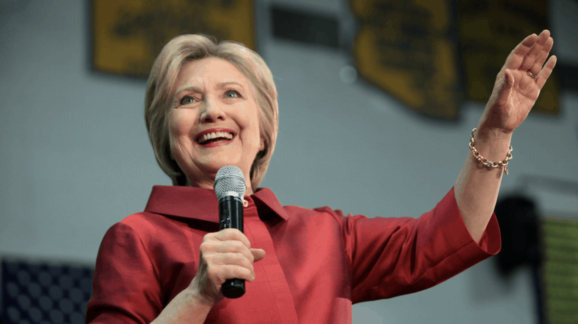Mark Janus Was With Hillary, Whether or Not He Wanted to Be
Unions compel public employees to support political candidates—and even the metric system.
This editorial was coauthored with David B. Rivkin Jr.
Flash back to the Las Vegas Convention Center, July 19, 2016. The floor overflows with people chanting, “We’re with her!” A speaker proclaims, to cheers and applause, that we “will stand with her in every corner of this nation.” Then Hillary Clinton takes the stage as the crowd rises in a standing ovation. She thanks them for supporting her campaign and rallies them to knock on doors and get out the vote.
The event wasn’t organized by the campaign. It was the 2016 convention of the nation’s largest union representing public-sector workers, the American Federation of State, County and Municipal Employees. The state of Illinois forced Mark Janus —an Illinois employee who refused to join the union—to pay for a portion that pro-Hillary rally.
Across the U.S., more than 500,000 state and local workers have objected to funding union advocacy but are nonetheless required by law to pay “fair share” fees to labor unions they have refused to join. The Supreme Court upheld the practice in a 1977 case, Abood v. Detroit Board of Education, reasoning that otherwise workers could “free ride” on the union’s collective bargaining. Prohibiting unions from charging nonmembers directly for political speech, it believed, would protect their First Amendment rights.
On Monday the justices will hear oral arguments in a challenge to that 1977 decision brought by Mr. Janus. They should heed Justice Felix Frankfurter’s observation, in an earlier case on mandatory union fees, that it is “rather naive” to assume “that economic and political concerns are separable.” As Mr. Janus argues, bargaining over wages, pensions and benefits in the public sector involves issues of intense public concern and thus core First Amendment-protected speech. A state law that forces public employees to fund that speech violates their rights, no less than compelling them to speak. ( Janus v. Afscme doesn’t consider these questions for unions in the private sector.)
Other unions that held pro-Clinton rallies include the American Federation of Teachers, the National Education Association and the Service Employees International Union, which represents about one million public workers. The SEIU convention passed a resolution that the union will “elect Hillary Clinton” as president “by mobilizing millions of voters.” Unions and state governments maintain that nonmembers can be charged for these conventions because they are where the unions adopt bargaining strategies and representational policies.
Afscme used its convention to weigh in on practically every major political issue. One resolution condemned Senate Republicans and demanded hearings and a vote on Judge Merrick Garland’s nomination to the Supreme Court. Others addressed funding for public infrastructure, educational spending, paid family and sick leave, private contracting of government services, the minimum wage, and “right to work” laws, with each resolution taking the expected union position.
More surprising were resolutions with no obvious connection to union interests—demanding gun-control laws, statehood for the District of Columbia, marijuana legalization, “comprehensive immigration reform with a pathway to citizenship,” “racial justice” and an end to state laws that protect religious freedom. Whatever Mr. Janus’s positions on these issues, he was forced to fund Afscme’s advocacy on them.
The American Federation of Teachers has charged nonmembers for advocacy supporting public funding for Planned Parenthood, the “climate justice movement” and a constitutional amendment to restrict political speech by overturning Citizens United v. Federal Election Commission—which, ironically, protects union as well as corporate speech.
But the National Education Association takes the cake. Its current resolutions stake out positions on topics from the adoption of constitutional amendments through the convention process of the Constitution’s Article V (NEA is opposed), to American participation in the International Court of Justice and International Criminal Court (thumbs up), to “covert operations and counterintelligence activities,” along with the “self-determination of indigenous people.” The NEA has spent objectors’ money on advocacy in favor of racial preferences, comprehensive sex education, restoration of voting rights for felons, and adoption of the metric system by the U.S.
Yes, the metric system.
These unions also charge nonmembers for training programs embodying the same political outlook. A recent AFT conference in Detroit featured sessions on participating in “the Resistance,” “fighting against Trump and [Education Secretary Betsy] DeVos, ” and “organizing a sanctuary campus” to block participation in the enforcement of federal immigration laws. The NEA, meanwhile, uses nonmembers’ fees to produce materials for teachers addressing “social justice” issues, such as “diversity,” “privilege,” and “hierarchies of oppression.”
These details reflect the basic truth that labor unions are political organizations. Everything they do, from massive political expenditures to bargaining activities, is shot through with political purpose and consideration. Under the First Amendment, they have the right to politic in all these ways—just as Mr. Janus has the right not to pay for it.
Messrs. Rivkin and Grossman practice constitutional and appellate law in Washington. Mr. Grossman filed a brief on behalf of the Competitive Enterprise Institute supporting Mr. Janus.
